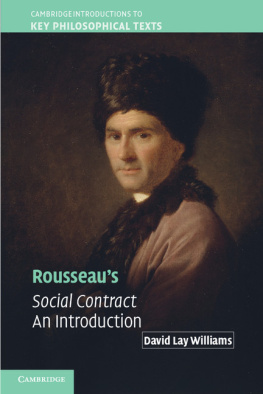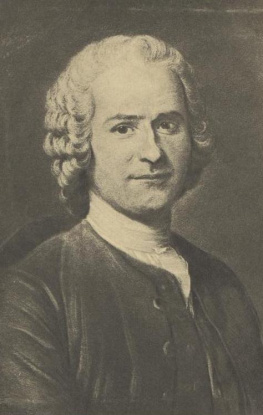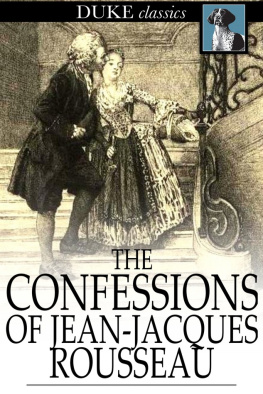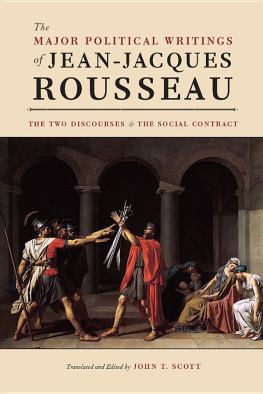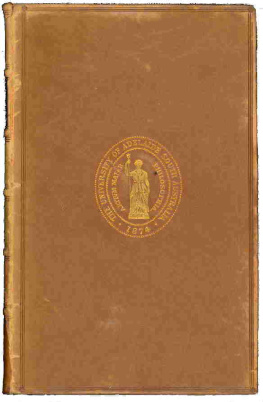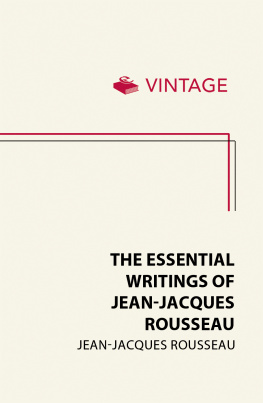Rousseau Jean-Jacques - Rousseaus social contract: an introduction
Here you can read online Rousseau Jean-Jacques - Rousseaus social contract: an introduction full text of the book (entire story) in english for free. Download pdf and epub, get meaning, cover and reviews about this ebook. City: New York, year: 2014;2013, publisher: Cambridge University Press, genre: Religion. Description of the work, (preface) as well as reviews are available. Best literature library LitArk.com created for fans of good reading and offers a wide selection of genres:
Romance novel
Science fiction
Adventure
Detective
Science
History
Home and family
Prose
Art
Politics
Computer
Non-fiction
Religion
Business
Children
Humor
Choose a favorite category and find really read worthwhile books. Enjoy immersion in the world of imagination, feel the emotions of the characters or learn something new for yourself, make an fascinating discovery.
- Book:Rousseaus social contract: an introduction
- Author:
- Publisher:Cambridge University Press
- Genre:
- Year:2014;2013
- City:New York
- Rating:5 / 5
- Favourites:Add to favourites
- Your mark:
- 100
- 1
- 2
- 3
- 4
- 5
Rousseaus social contract: an introduction: summary, description and annotation
We offer to read an annotation, description, summary or preface (depends on what the author of the book "Rousseaus social contract: an introduction" wrote himself). If you haven't found the necessary information about the book — write in the comments, we will try to find it.
Rousseau Jean-Jacques: author's other books
Who wrote Rousseaus social contract: an introduction? Find out the surname, the name of the author of the book and a list of all author's works by series.
Rousseaus social contract: an introduction — read online for free the complete book (whole text) full work
Below is the text of the book, divided by pages. System saving the place of the last page read, allows you to conveniently read the book "Rousseaus social contract: an introduction" online for free, without having to search again every time where you left off. Put a bookmark, and you can go to the page where you finished reading at any time.
Font size:
Interval:
Bookmark:

If the greatness of a philosophical work can be measured by the volume and vehemence of the public response, there is little question that Rousseaus Social Contract stands out as a masterpiece. Within a week of its publication in 1762 it was banned in France. Soon thereafter, Rousseau fled to Geneva, where he saw the book burned in public. At the same time, many of his contemporaries, such as Kant, considered Rousseau to be the Newton of the moral world, as he was the first philosopher to draw attention to the basic dignity of human nature. The Social Contract has never ceased to be read and debated in the 250 years since its publication. Rousseaus Social Contract: An Introduction offers a thorough and systematic tour of this notoriously paradoxical and challenging text. David Lay Williams offers a chapter-by-chapter reading of the Social Contract , squarely confronting its interpretive obstacles, leaving no stones unturned. The conclusion connects Rousseaus text to both his important influences and those who took inspiration and sometimes exception to his arguments. The book also features a special extended appendix dedicated to outlining his general will, which has been the object of controversy since the Social Contract s publication.
DAVID LAY WILLIAMS is Associate Professor of Political Science at DePaul University and the author of Rousseaus Platonic Enlightenment (2007) and The General Will: The Evolution of a Concept (forthcoming from Cambridge University Press), as well as numerous articles in journals such as History of Political Thought , Journal of the History of Ideas , The Journal of Politics , the American Journal of Political Science , and Polity . He has twice held fellowships at the Institute for Research in the Humanities at the University of WisconsinMadison, as well as a fellowship at the DePaul Humanities Center. He was formerly Professor of Philosophy and Political Science at the University of WisconsinStevens Point.
This new series offers introductory textbooks on what are considered to be the most important texts of Western philosophy. Each book guides the reader through the main themes and arguments of the work in question, while also paying attention to its historical context and its philosophical legacy. No philosophical background knowledge is assumed, and the books will be well suited to introductory-level university courses.
For a list of titles published in the series, please see .


In Memory of Richard Taylor Williams, Sr.
One does not write a book like this without a good deal of assistance, and I have been fortunate to have received more than my fair share. I want to thank Nicholas Dent, Ryan Patrick Hanley, Christopher Kelly, Michael Locke McLendon, Ethan Putterman, Grace Roosevelt, Melissa Schwartzberg, and Matthew Simpson for sharing their expertise on Rousseau repeatedly in many unexpected and especially helpful ways. Daniel J. Kapust and Andrew Laird offered helpful insights on Roman politics, history, and culture when I was writing . A. P. Martinich patiently answered numerous inquiries on Thomas Hobbes. Nerissa Nelson and Alex Schmetzke were especially helpful and creative in assisting with various elements of this project at the University of WisconsinStevens Point library. Jonathan Bloch, Alan J. Kellner, Matthew W. Maguire, Jonathan Marks, J. Rixey Ruffin, and an anonymous reader at Cambridge read this manuscript carefully, improving it significantly on myriad points. I would also like to thank Beatrice Rehl at Cambridge University Press for her confidence in and guidance on this project.
I also greatly benefited from the support of numerous friends and colleagues, including Ken Abrams, Dave Arnold, Michael and Carey Cairo, Darren Carlton, David Chan, Polo Chen, Jennifer Collins, James Farr, Doug Forbes, Karin Fry, Mark Hawley, Tracy Hofer, Anna Law, Brad and Megan Mapes-Martins, Ed Miller, Steven Nadler, Sean Phillips, James and Toni Sage, Greg Summers, Frank Thames, Mick Veum, and Scott Wallace. I also am grateful for administrative support from John Blakeman, Chris Cirmo, Susan Friedman, Wayne Steger, Chuck Suchar, and Dna Warren. Along these lines, I want to thank the departments of Philosophy and Political Science at the University of WisconsinStevens Point, the Institute for Research in the Humanities at the University of WisconsinMadison, the DePaul Humanities Center, and the Department of Political Science at DePaul University for providing academic homes during the past few years in which I developed and completed this project.
Font size:
Interval:
Bookmark:
Similar books «Rousseaus social contract: an introduction»
Look at similar books to Rousseaus social contract: an introduction. We have selected literature similar in name and meaning in the hope of providing readers with more options to find new, interesting, not yet read works.
Discussion, reviews of the book Rousseaus social contract: an introduction and just readers' own opinions. Leave your comments, write what you think about the work, its meaning or the main characters. Specify what exactly you liked and what you didn't like, and why you think so.

